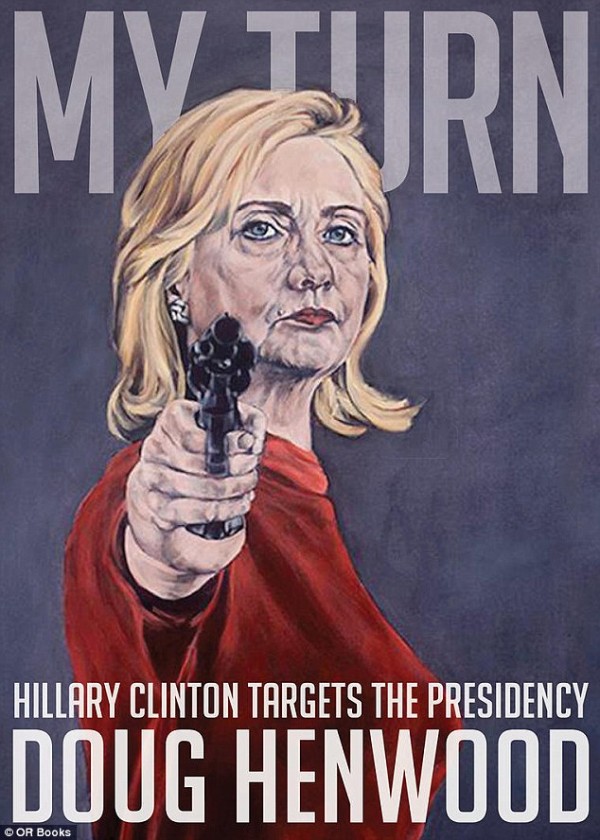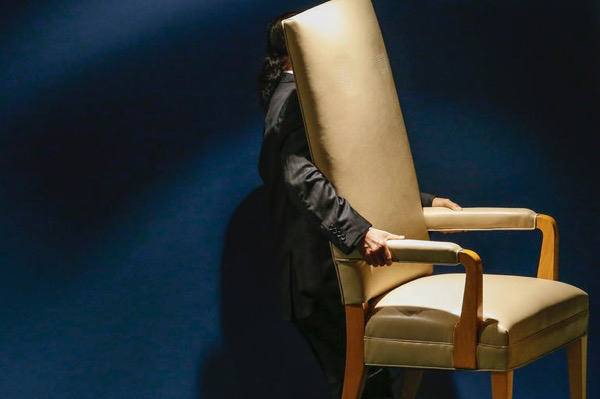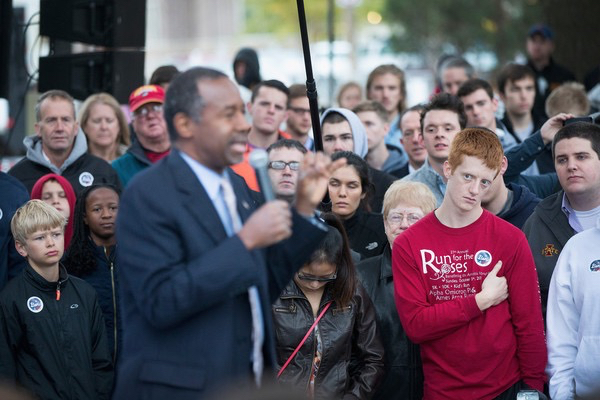Notes
Weaponized Entitlement: Book Cover Frames a Gun-Toting Clinton as Deviant, Dangerous
When Nation Magazine contributing editor Doug Henwood chose an 8-year-old painting of Hillary Clinton as the cover image for his new book, he stoked the anti-Clinton fires that have had some on the Left feeling the Bern. Clinton is trouncing Sanders in national polls and has overtaken him in primary states such as South Carolina and New Hampshire; She is racking up Democratic endorsements by the hundreds; and her performance in the first Democratic candidate debate and the recent Benghazi hearings has underscored her position of strength. Clinton’s status as the unequivocal frontrunner should be a major advantage, but opponents on both the left and right are attempting to cast it as a liability.
How so? By creating a gendered narrative of entitlement that suggests that Clinton is bullying and bossing her way into the Democratic nomination. When paired with the book’s title, “My Turn,” artist Sarah Sole’s image weaponizes that entitlement, casting Clinton’s presidential ambitions as deviant and dangerous. This narrative is fundamentally sexist because of how differently it treats Clinton’s political strength in comparison to that of her opponents and of the men who have made multiple runs.
One question that routinely gets raised about prospective presidential candidates is whether they have the “fire in the belly” needed to succeed in a long and grueling campaign. Far from being a disqualifier, personal and political ambition typically has been a prerequisite. Moreover, prospective male candidates routinely seek their party’s nomination more than once before earning the nomination (e.g. Bob Dole, John McCain, Mitt Romney, etc.), with their stature often rising during later bids.
Clinton’s multiple bids, however, have been presented as signs of an unhealthy thirst for power and as proof that she will do anything to get what she wants. This narrative has been constructed in political and popular media for years—The Onion even lampooned the trend as early as 2006. Ambition in women is often evaluated as proof that they are unnatural, dangerous, and obsessive. During the 2008 Democratic primary, Clinton was famously compared to Glenn Close’s character in Fatal Attraction. That comparison also came from a liberal male journalist, Ken Rudin (at the time, he served as political editor for NPR). The “My Turn” image depicts a cold and calculating Clinton, ready to take the presidency by force. Although the book’s subtitle suggests that she is “Target[ing] the Presidency,” the gun is trained on the reader/voter, heightening the perception of personal threat.
Henwood’s choice to feature a gun-toting Clinton also is notable because Clinton has made gun control a major campaign initiative and recently criticized Sanders for voting against Congressional legislation that required stricter background checks. Intended by the artist to be a marker of Clinton’s strength, in the context of the current news cycle the image tacitly but forcefully impugns the authenticity of Clinton’s anti-gun sentiments.
Some have suggested that the image is not explicitly sexist, since one can imagine the same sort of cover featuring a male politician. But the image resonates differently because of our culture’s historic vilification of female power. Slate’s Nora Caplan-Bricker points out that
in the context of a book that lambasts Clinton’s hawkishness and ambition, it plays into the stereotype that any woman who wields force is cartoonishly unnatural, a villain.
Early talk about the cover on Facebook was replete with misogynistic stereotypes. Geoff Schecht argued that it was “an appropriate enough book cover. Talk about being ruled over by The Wicked Witch of the West should Hillary win the election.” Sandy Gudaitis concurred, asking, “Her turn to be a witch? She’s been that for most of her life.”Henwood’s attempt to deny that the image had misogynistic overtones was particularly ironic. According to an MSNBC piece by Erica K. Landau, Henwood asserted,
What I don’t get is the reaction that calls the cover sexist . . . I have no problem with ball-busting women.
As Henwood knows, “ball-busting women” tend not to fare well at the U.S. ballot box. Herein lies the real problem for Clinton and for other female presidential prospects. It’s the first timer/frontrunner dilemma. As Kristina Horn Sheeler and I argue in our book Woman President: Confronting Postfeminist Political Culture, although women have been running for over 100 years in the United States, they have been tagged as perpetual presidential novices—first timers who lack the gravitas and/or experience needed to win. Consequently, seasoned political pros like Pat Schroeder and Elizabeth Dole couldn’t muster the funds and party endorsements needed to succeed in their party’s primary contests. Hillary Clinton solved that problem and has sustained her status as the frontrunner for the Democratic presidential nomination. Now, however, her position as frontrunner is being used to suggest that the nomination process is anti-democratic. That her strength emerges from a dynastic sense of entitlement or a pathological will to power. To be sure, Hillary Clinton’s sights are trained on the U.S. presidency; her critics, however, are targeting much more than her political record.
Karrin Anderson | @KVAnderson
(Original Art: Sarah Sole; book published by O/R Books)



Reactions
Comments Powered by Disqus